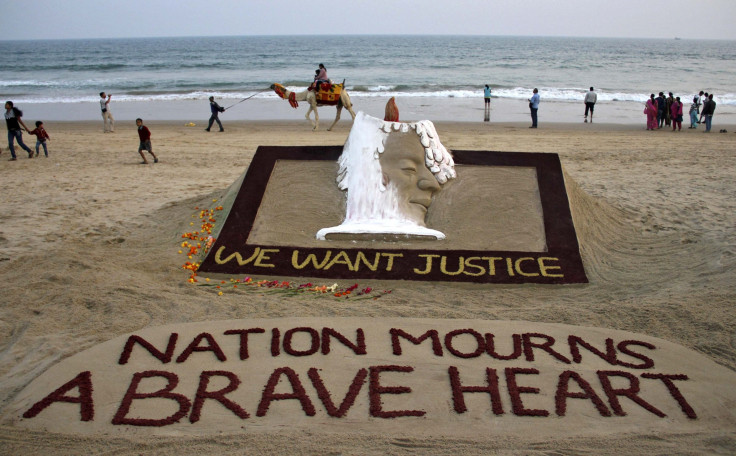Delhi Gang-Rape: Minor Was Allegedly The Most Brutal Among Accused; Will India Amend Juvenile Justice Act?

One of the six accused men in the Delhi gang-rape case is allegedly a juvenile and will be let off with a lenient sentence if his juvenile status is verified, despite the fact that police say he was the “most brutal” among the six accused.
A 23-year-old medical student was brutally gang-raped on a moving bus in Delhi on Dec. 16. The accused assailants allegedly raped her repeatedly, inflicted barbaric injuries on her before throwing her and her male friend out of the bus. The girl succumbed to her injuries on Dec 29.
The police have arrested all six of the accused attackers, including the juvenile who has reportedly six months left until he turns 18.
The police have charged all the accused except the juvenile with murder. According to the Delhi police, the juvenile was the most brutal of them all.
The police said the minor raped the victim twice, penetrated her with an iron rod and extracted her intestines with his bare hands before suggesting to the others that they throw her off the moving bus, the Hindustan Times reported.
The primary adult who is accused, Ram Singh, and the minor were allegedly barbaric with the victim, inflicting internal injuries on her, Delhi police sources told media.
"Of all the persons in the bus, two had engaged in the most barbarism -- Ram Singh, the main accused in the case, and the juvenile," said an officer.
"Both of them had subjected her to sexual abuse twice. Singh was the first to rape her, followed by the juvenile and then Akshay. Later, when she lost consciousness, Singh and the juvenile raped her a second time," the Hindustan Times reported.
The minor has given a school certificate as a proof for his minor status. However, authorities were conducting medical tests on him to determine his age. If he is proved to be a minor, he will face a separate trial in a juvenile justice board, according to existing laws. The maximum punishment he gets then would be up to three years of imprisonment with an option to seek bail.
The rape incident and subsequent death of the woman have shocked the nation, which saw a massive public movement seeking tougher laws to punish rapists.
The reports of the alleged role of the minor have triggered a demand from various corners for amending the Juvenile Justice Act (JJ Act) to limit a juvenile’s official age at 15 years. The victim’s family also demanded that the case should be treated as rare crime, and that the minor should be hanged.
"The juvenile should be punished first ... he was the one who lured my daughter into the bus and tortured her most mercilessly. He should be hanged like the other five accused," he said, speaking to the Economic Times (ET) from his native town Ballia in Uttar Pradesh.
"Imagine his brutality when he is 17 ... what a demon he would become once he is older? The government should reduce the juvenile age to 12 or 15 years," he was quoted as saying by the ET.
The government is mulling over amending the Juvenile Justice Act to increase punishment of juveniles -- or to reduce the age limit of juveniles -- in cases of heinous crimes.
"We can have a provision by which six months or a year of the juvenile's age can be waived if the crime committed is severe in nature, like in this case. If the juvenile has committed a violent or serious crime, he can be tried under law as an adult," Women and Child Development Minister Krishna Tirath was quoted as saying by the Times of India.
Experts point out that while revising the law may help punish future offenders, it will not help in the Delhi rape case as such laws cannot be implemented retroactively. Moreover, India is a signatory to the United Nations Convention on the Rights of a Child, which it ratified in 1992.
India amended the Juvenile Justice Act of 1986 in 2000 to comply with the UNCRC regulations, and if the government amended the law to redefine the juvenile age or enhance the punishment, it would be a violation of the U.N. convention, Nitin R, a criminal rights advocate based in Bangalore, told the IBTimes.
He said that giving the death penalty to minors was illegal under the JJ Act. There is an absolute ban on awarding capital punishment and life imprisonment to a minor, he said.
In addition, if a minor is sentenced to the maximum punishment of three years, he or she will be sent to an observation home for correction and not to jail.
The minor would also enjoy privileges like the right to anonymity so that he or she cannot be identified in the media, according to Nitin. The law says, “No report in any newspaper, magazine, news-sheet or visual media of any inquiry regarding a juvenile in conflict with law or a child in need of care and protection under this Act shall disclose the name, address or school or any other particulars calculated to lead to the identification of the juvenile.”
However, in regard to the accused men in the Delhi rape case, the minor has been identified by a section of the media.
According to the critics of the existing law, the leniency in the punishment given to juveniles accused of heinous crimes has contributed to an increase in the incidents of crimes committed by minors.
© Copyright IBTimes 2024. All rights reserved.












